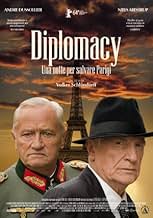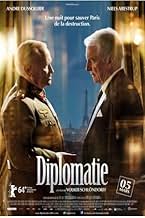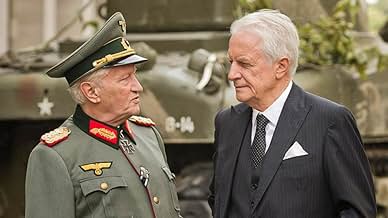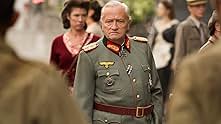Diplomatie
- 2014
- Tous publics
- 1h 24m
IMDb RATING
7.1/10
6.1K
YOUR RATING
A historical drama that depicts the relationship between Dietrich von Choltitz, the German military governor of occupied Paris, and Swedish consul-general Raoul Nordling.A historical drama that depicts the relationship between Dietrich von Choltitz, the German military governor of occupied Paris, and Swedish consul-general Raoul Nordling.A historical drama that depicts the relationship between Dietrich von Choltitz, the German military governor of occupied Paris, and Swedish consul-general Raoul Nordling.
- Awards
- 5 wins & 6 nominations total
Pierre-Marie Rochefort-Schneider
- Opérateur radio
- (as Pierre-Marie Rochefort)
Featured reviews
I enjoyed this film very much! First of all it is a very interesting recreation of a stage play into a film. Plot is interesting well enough since the subject is of a great interest to the general public, one night in August of 1944 when general in command of Paris had to decide should he follow Hitlers orders and blow up Paris or to surrender without doing it. He made good decision, we should be grateful that he had piece of sanity left not to blindly follow those orders.
Acting is excellent by both principal actors, and other actors as well.
If you are a World War II buff this is a must see for you, but I strongly recommend that you see this film anyways, because it is just short of a masterpiece.
Acting is excellent by both principal actors, and other actors as well.
If you are a World War II buff this is a must see for you, but I strongly recommend that you see this film anyways, because it is just short of a masterpiece.
"Diplomatie" (2014 release from France; 90 min.) is the big screen adaptation of the theatre play of the same name by Cyril Gely. (Disclaimer: I have not seen the theatre play.) The story takes place on the eve of the liberation of Paris in late August, 1944. The German commander-in-charge, General von Choltitz, has orders to destroy all of the main landmarks of Paris (Louvre, Eiffel Tower, Notre Dame cathedral, etc.). Enter French diplomat Raoul Nordling, who tries talking von Choltitz out of implementing the orders from Berlin. To tell you more would spoil your viewing experience, you'll just have to see for yourself how it all plays out.
Several comments: this movie is directed by none other than legendary German film maker Volker Schlöndorff, yes he of "The Tin Drum" from the late 1970s. Who knew he was still around and making movies? Second, while on some occasions there are scenes shot outside, beware that most of the movie takes place in the room at the Hotel Meurice where General von Scholtitz is based, and it truly needs to be emphasized that this is a theatre play brought to the big screen, but still very much a theatre play. Last but certainly not least, the acting performances of the two lead actors (André Dussollier as Raoul Nordling, and Niels Arestrup as General von Choltitz) are nothing short of top-notch and truly carry the film.
"Diplomatie" has garnered rave reviews in Europe, and the screening I saw this at in Antwerp, Belgium last week during a recent family visit, was very well attended. Still, I don't know to what extent this success could be replicated in the US. For me, the movie was a slight bit too static to fully engage me from start to finish. But I would readily suggest that you check this movie out if you get the chance, and draw your own conclusions.
Several comments: this movie is directed by none other than legendary German film maker Volker Schlöndorff, yes he of "The Tin Drum" from the late 1970s. Who knew he was still around and making movies? Second, while on some occasions there are scenes shot outside, beware that most of the movie takes place in the room at the Hotel Meurice where General von Scholtitz is based, and it truly needs to be emphasized that this is a theatre play brought to the big screen, but still very much a theatre play. Last but certainly not least, the acting performances of the two lead actors (André Dussollier as Raoul Nordling, and Niels Arestrup as General von Choltitz) are nothing short of top-notch and truly carry the film.
"Diplomatie" has garnered rave reviews in Europe, and the screening I saw this at in Antwerp, Belgium last week during a recent family visit, was very well attended. Still, I don't know to what extent this success could be replicated in the US. For me, the movie was a slight bit too static to fully engage me from start to finish. But I would readily suggest that you check this movie out if you get the chance, and draw your own conclusions.
My wife and I went to see this film a few days ago, I loved it. Excellent acting! I find the title, "Diplomatie" to fit in very well with the observation that the Swedish diplomat clearly had no intention whatever to honour his promises to the German general (i.e. to take care of his family in mortal danger of suppression by the Nazi establishment). In other words, my reading is that diplomatic practice apparently provides the practitioner of that particular political act the green light to do whatever he deems necessary to reach the objective of the "raison d'état", not excluding playing on emotions or even outright lying. Not a pretty observation. Is it correct? Neither am I convinced the film is to be taken as historically correct: the decision not to destroy Paris was the result of a balanced appraisal of the fact that it was not the communists (resistance) that liberated Paris, but ...Spanish... troops in the service of General De Gaulle executing an agenda not quite in line with American instructions. Comme quoi History is often written with a small "h".
Diplomacy (2014)
Blow up Paris? Notre Dame, the Eiffel Tower, the Louvre? Yes—almost. And for real. It's 1944.
In the final days (or day) of the German occupation of Paris, as the Allies were moving very quickly in, the Germans (under Hitler's orders) were increasingly desperate. And bitter. They were going to leave the lovely city in ruins—you know that kind of baby attitude, if I can't have it you can't have it either.
Well, we know that Paris was not blown up. (The city famously survived the truly brutal World War II with hardly a scratch, compared to the rest of Europe.) And the final decision —to do it or not—fell to one man, ultimately, aging commanding German General Choltitz. And a man appears in his quarters who we learn is the Swedish diplomat Raoul Nordling. Nordling sees the crisis, and sees the general's quandary, and has to find a way to stop the madness.
And so we have a condensed version of some very real events. The movie is based on a play which by necessity distilled this down to mostly these two characters in their hotel, though we are given a convincing sense of the city and the Germans around the hotel.
This is high drama in its purest simplest form—conversation. The men try to understand each other. The general knows the Swede is trying to persuade him, and the Swede knows the general is under orders that can't be defied. There is the moment, and then there is history, and how the world will later look on the moment. And it all is spelled out with such delicious economy and psychology, it's riveting.
And even though you know that Paris survives, you won't know why or how, or how close it came to rubble, until you see this.
Blow up Paris? Notre Dame, the Eiffel Tower, the Louvre? Yes—almost. And for real. It's 1944.
In the final days (or day) of the German occupation of Paris, as the Allies were moving very quickly in, the Germans (under Hitler's orders) were increasingly desperate. And bitter. They were going to leave the lovely city in ruins—you know that kind of baby attitude, if I can't have it you can't have it either.
Well, we know that Paris was not blown up. (The city famously survived the truly brutal World War II with hardly a scratch, compared to the rest of Europe.) And the final decision —to do it or not—fell to one man, ultimately, aging commanding German General Choltitz. And a man appears in his quarters who we learn is the Swedish diplomat Raoul Nordling. Nordling sees the crisis, and sees the general's quandary, and has to find a way to stop the madness.
And so we have a condensed version of some very real events. The movie is based on a play which by necessity distilled this down to mostly these two characters in their hotel, though we are given a convincing sense of the city and the Germans around the hotel.
This is high drama in its purest simplest form—conversation. The men try to understand each other. The general knows the Swede is trying to persuade him, and the Swede knows the general is under orders that can't be defied. There is the moment, and then there is history, and how the world will later look on the moment. And it all is spelled out with such delicious economy and psychology, it's riveting.
And even though you know that Paris survives, you won't know why or how, or how close it came to rubble, until you see this.
This is a brilliant film.
Masterfully set in the tense historical and ideally theatrical moment, the story demonstrated that the combination of the power of the iron will and the eloquent linguistic skills, both built on the trust of the two human beings, was able to defy something impossible.
From the linguistic point of view, the film was made very realistic, switching between German and French. This is a relief, given a flood of supposedly European movies of recent with a way too many English speaking characters.
I want my children to watch this film to eyewitness the history and perhaps something more important than that: Words, not the sword, saved Paris and her people from calamity.
Masterfully set in the tense historical and ideally theatrical moment, the story demonstrated that the combination of the power of the iron will and the eloquent linguistic skills, both built on the trust of the two human beings, was able to defy something impossible.
From the linguistic point of view, the film was made very realistic, switching between German and French. This is a relief, given a flood of supposedly European movies of recent with a way too many English speaking characters.
I want my children to watch this film to eyewitness the history and perhaps something more important than that: Words, not the sword, saved Paris and her people from calamity.
Did you know
- Quotes
Général von Choltitz: Do you know what we do to men like you?
Raoul Nordling: Give them a medal?
Général von Choltitz: [breaking a smile] Yes, on occasion.
[stern again]
Général von Choltitz: Posthumously.
- ConnectionsFeatured in Diplomatie: Making of (2015)
- SoundtracksLa 7ème symphonie
Music by Ludwig van Beethoven (as Beethoven)
Conducted by Wilhelm Furtwängler
Berlin 1943 © Société Wilhelm Furtwängler
Performed by Berliner Philharmoniker (uncredited)
- How long is Diplomacy?Powered by Alexa
- Officer's salute when leaving von Choltitz's office
Details
- Release date
- Countries of origin
- Official site
- Languages
- Also known as
- Diplomacy
- Filming locations
- Jardin des Tuileries, Paris 1, Paris, France(city park in front of the hotel)
- Production companies
- See more company credits at IMDbPro
Box office
- Gross US & Canada
- $230,880
- Opening weekend US & Canada
- $8,518
- Oct 19, 2014
- Gross worldwide
- $4,207,242
- Runtime1 hour 24 minutes
- Color
- Sound mix
- Aspect ratio
- 2.35 : 1
Contribute to this page
Suggest an edit or add missing content





























